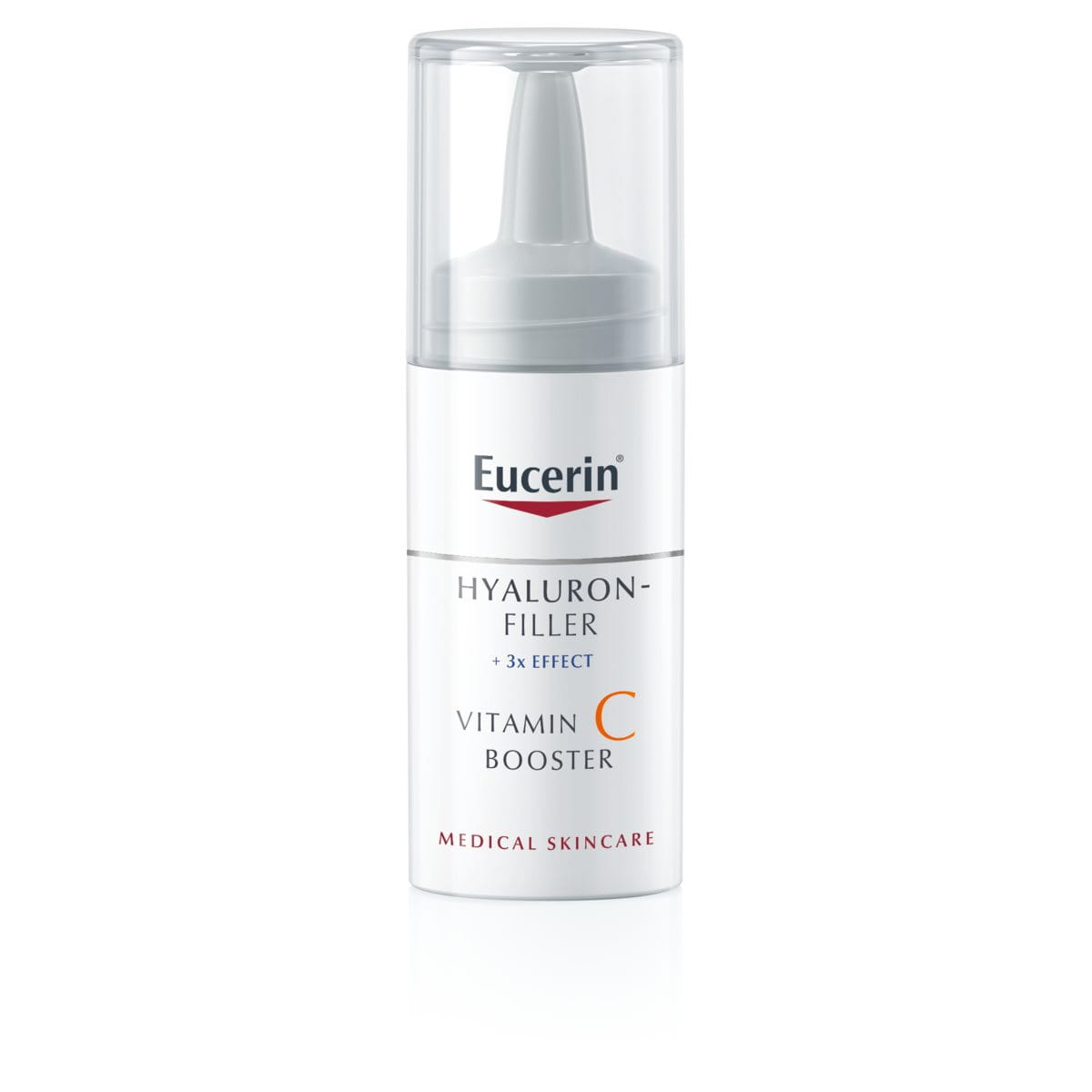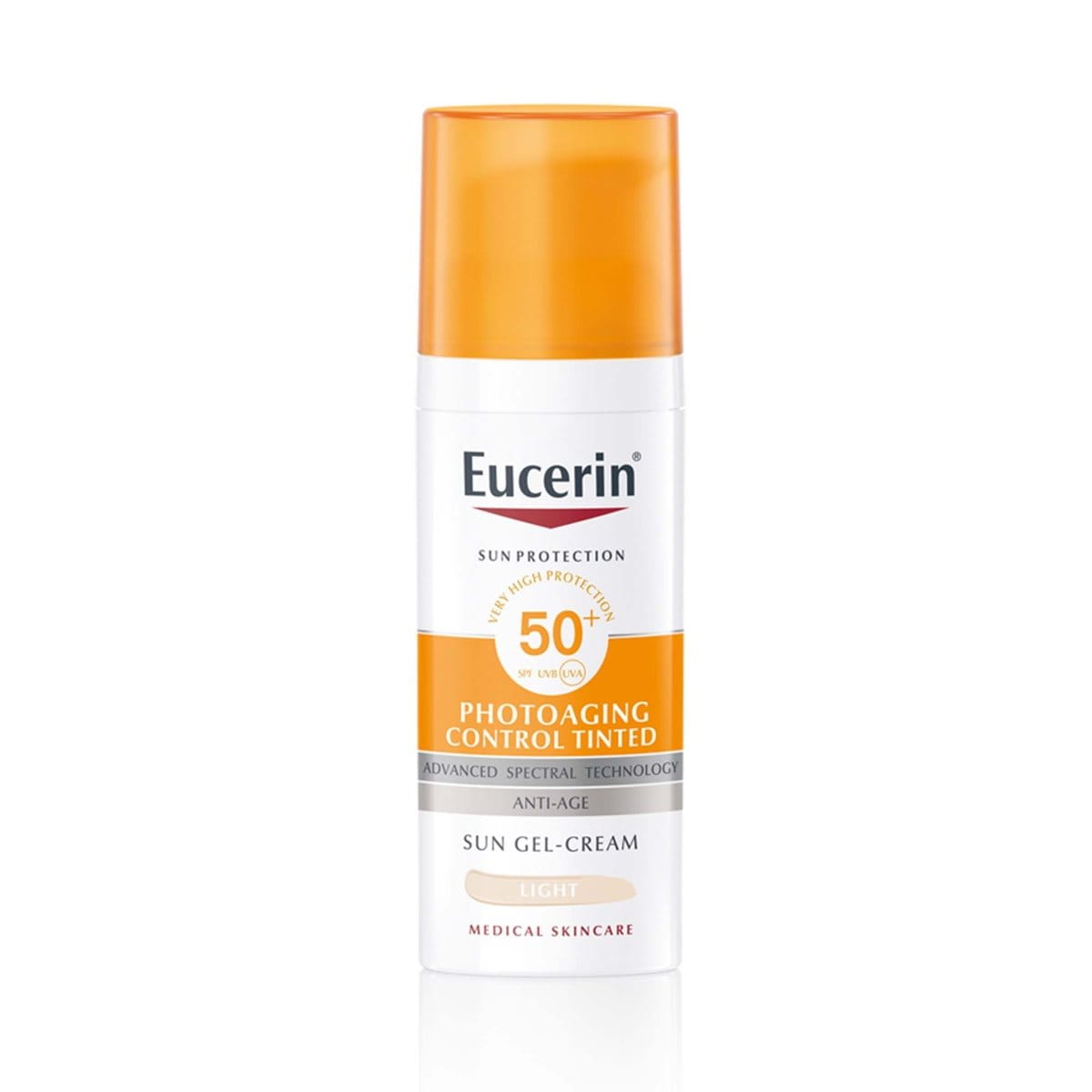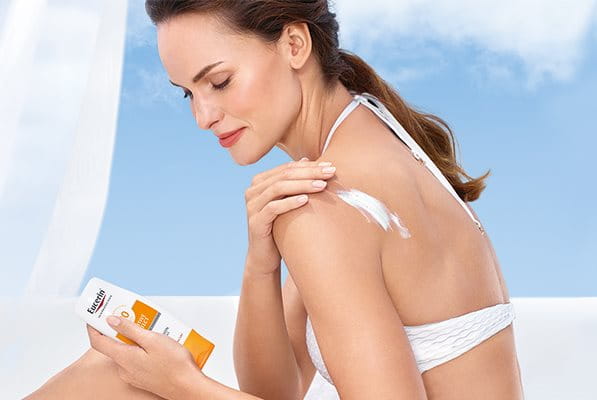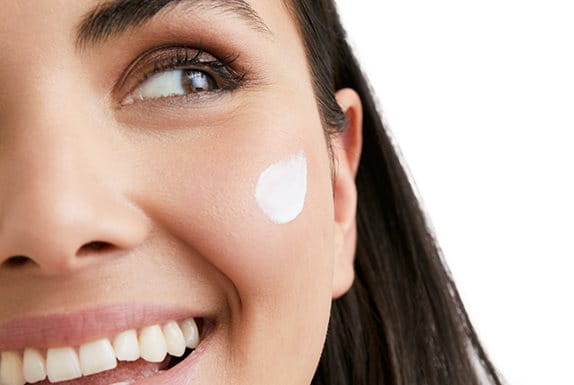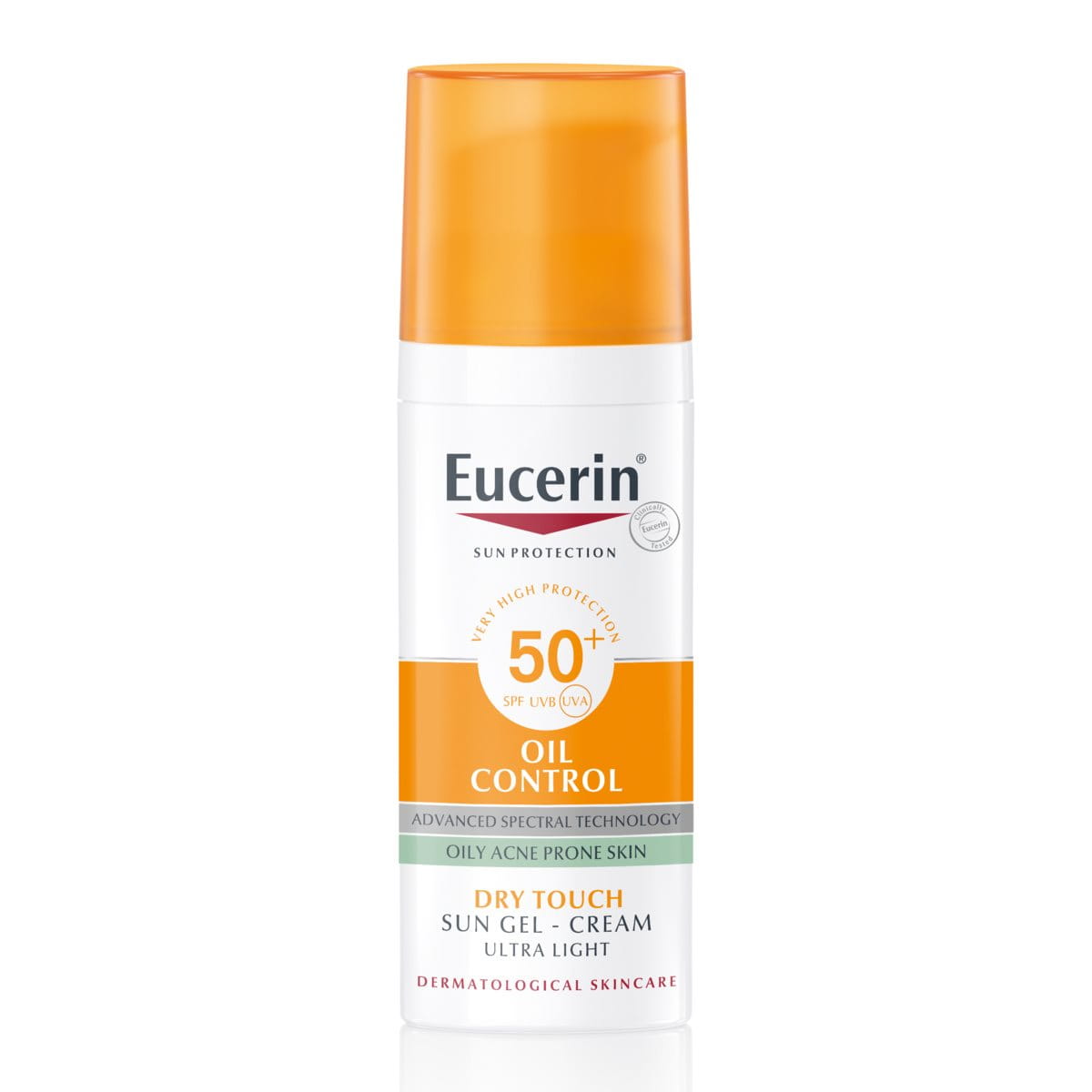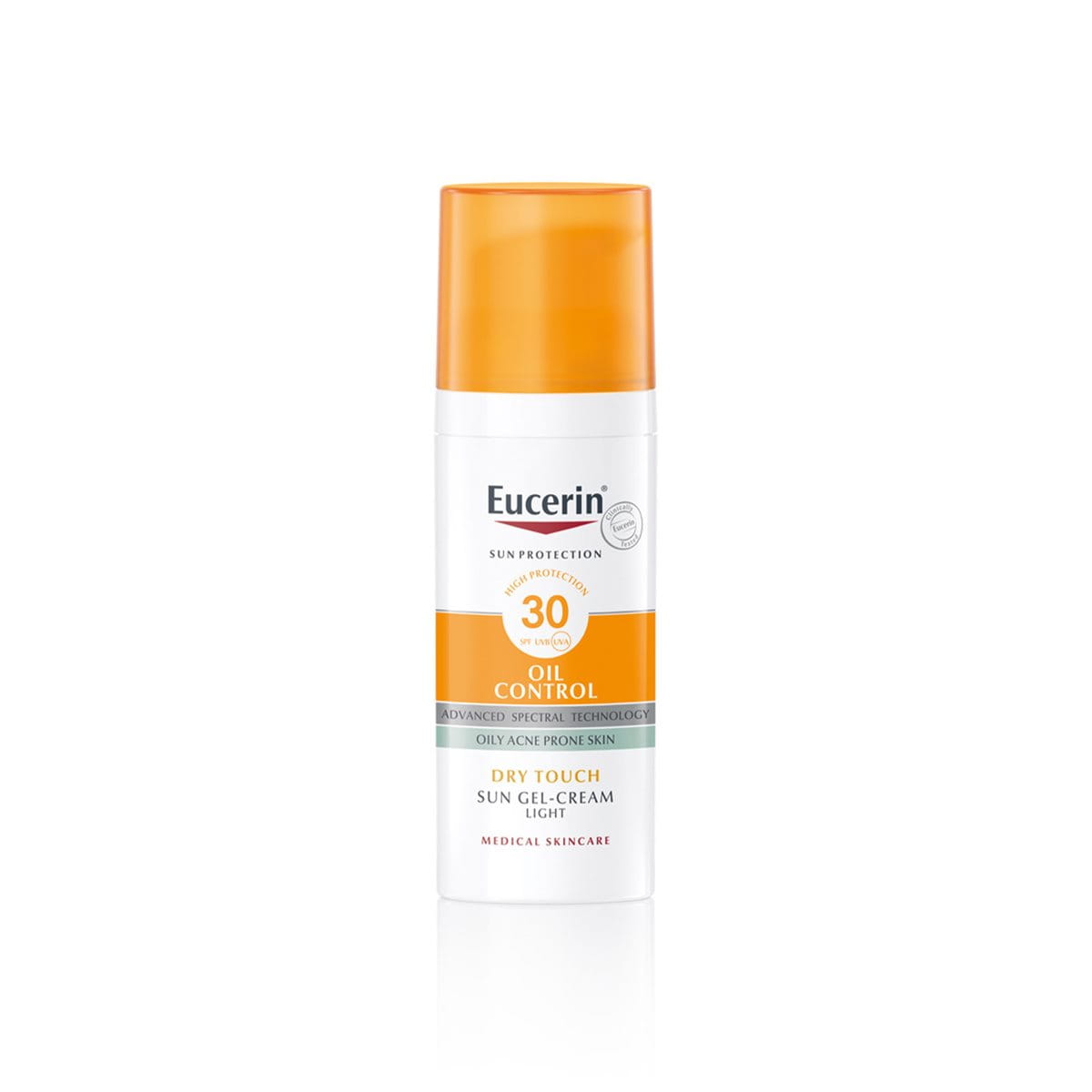Our face, neck and décolleté are more exposed to the sun than almost any other part of our bodies. They benefit from daily sun protection that has been specially formulated for facial skin and that matches your skin type and condition. This article looks at how to protect your face, how to choose the right products for your skin and why you should make sun protection part of your morning skincare routine.
How does the sun affect facial skin?
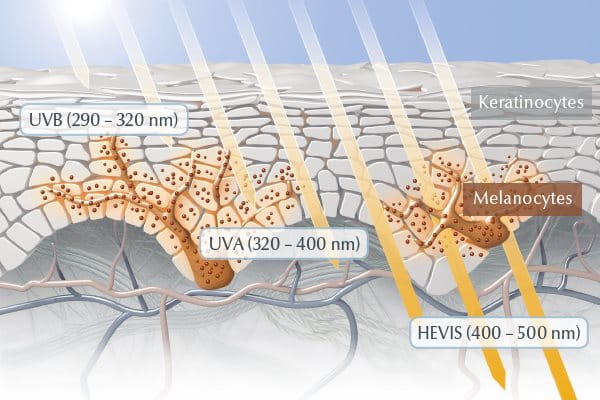

Sun, in moderation, is good for our health but over-exposure to the sun’s rays can cause both short- and long-term skin damage. You can read about how the sun affects skin, both on the surface and at a cellular level, in How do UVA, UVB and HEVIS light rays affect skin?
Not all skin reacts in the same way to the sun. Our age, as well as our skin type and condition, can make us more sensitive to exposure. You can find out more in Why do babies and children need special sun protection? and Sensitive skin: why does it need daily sun protection?

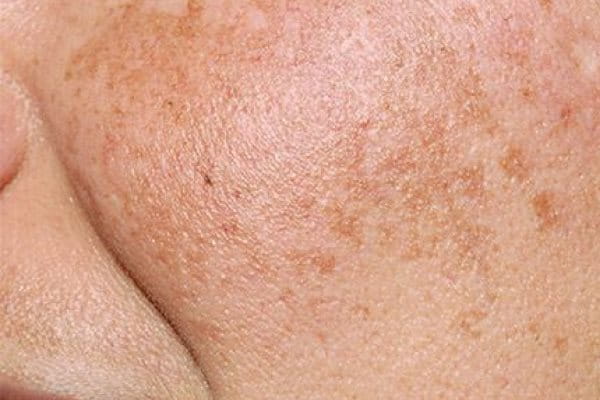
The skin on some parts of the body is also more sensitive to the sun, and more susceptible to sun damage, than skin in other areas. Facial skin is:
- Thinner: the epidermis of facial skin is about 0.12mm thick while the body’s average is around 0.60mm)
- More exposed: being mostly uncovered, it is exposed to the sun (and other elements) on a daily basis
It’s not just holiday sun that affects skin. UV rays (UVA in particular) and high- energy visible (HEVIS) light are present all day, every day – winter as well as summer and on cloudy days as well as sunny ones. Our faces are ofen one of the first parts of the body to show visible signs of sun-induced skin damage such as sunburn, photoaging (premature skin aging caused by the sun) and hyperpigmentation. And, being always on show, the signs of sun damage are particularly visible on our faces and necks.
How can I protect my face from the sun?

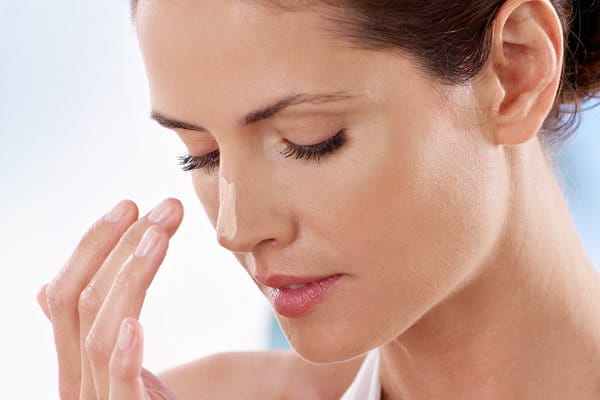
A sensible attitude to the sun is the best way to minimize the risk of sun damage to your face:
- Avoid overexposure to the sun and keep out of direct sunlight during its most intense hours.
- Keep skin covered with protective clothing, including a sun hat and glasses, whenever possible. A sun hat is particularly important if you are bald or have thinning hair.
- Sun protection can help to reduce cellular DNA damage, photoaging (premature aging caused by the sun) and hyperpigmentation. Choose a sun protection product that offers the appropriate level of protection for your skin and the external conditions and that, ideally, has been specially formulated to suit your skin type and condition.
- Make facial sun protection part of you morning skin care routine and apply it every day, even on cloudy days.
- Don’t forget your neck and, if it is going to be exposed and you are not already protecting it with a body sunscreen, your décolleté
- Take particular care in the sun and wear a very high protection factor. If you are taking certain medications (such as those prescribed for acne) or if you have recently had a chemical peel or laser treatment .
For advice on how to care for skin on other parts of your body read How should I protect my body from the sun ? To find out the best ways to protect young skin read Why do babies and children need special sun protection ?
How should I choose the right sun protection product for my face?
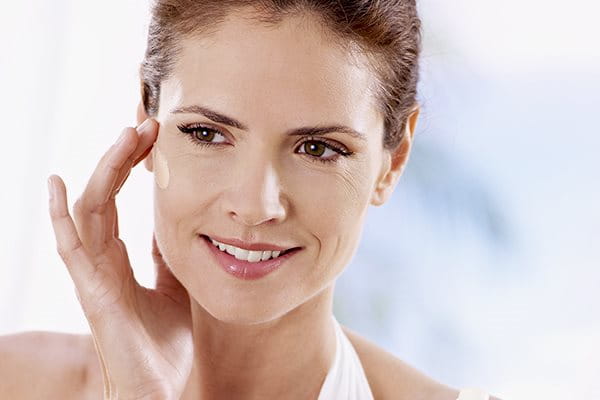
Look out for products that:
- not only protect skin from UVA and UVB rays but also offer HEVIS light defense
- offer the appropriate level of protection for your skin
- are specially formulated to suit your skin type and condition and that help to address any skin concerns you may have
UVA and UVB protection and HEVIS light defense for your face
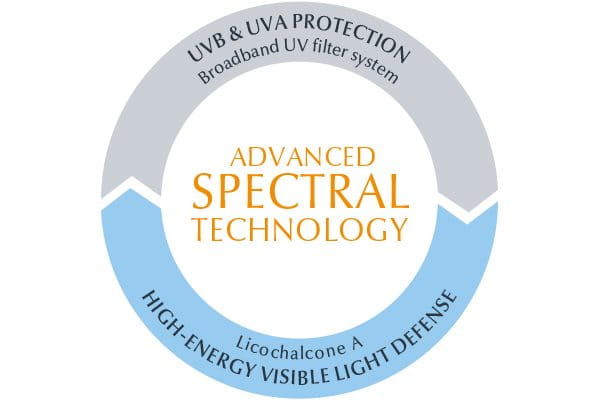
All the face products in Eucerin’s superior sun protection range include Eucerin’s innovative Advanced Spectral Technology which combines broadband and photostable UVA/UVB filters1 for reliable UV protection with antioxidant Licochalcone A, a powerful anti-oxidant that works to neutralize free radicals caused by UV and HEVIS light. The formulas also include Glycyrrhetinic Acid which supports skin’s own DNA repair mechanism.
1 Meeting the high standards for UVA and UVB protection defined by Cosmetics Europe. The levels of UVA protection are higher than the EU recommendation.
The appropriate level of protection for your facial skin

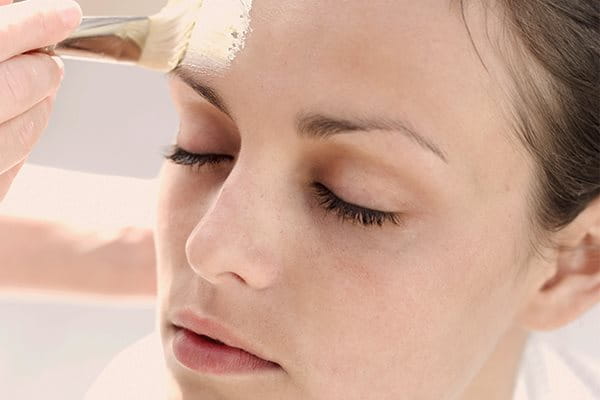
Sunscreens are available in four different levels of protection: low (factor 6 to 10), medium (15 to 25), high (30 to 50) and very high (50+). The higher the protection factor the better your skin is protected.
We recommend that:
- you always use a high or very high SPF on facial skin
- if you are taking medication that increases your skin’s sensitivity to the sun (such as certain acne medication ) or have recently had a chemical peel or laser treatment on your face you try to avoid direct exposure to the sun and wear a very high SPF
- you choose an SPF that suits your skin’s needs: for example, pale skin or skin that is particularly sensitive to the sun benefits from very high sun protection
- you take into account the intensity of the sun and the amount of time you are going to be in it: sun is at its strongest during the summer months, at high altitudes and when you are closest to the equator
The Eucerin sun protection range includes a comprehensive selection of face products that offer high and very high levels of sun protection.
Facial sun protection that’s tailored to your skin type, condition and concerns
Skin benefits from sun protection products that are specially formulated to address its specific needs.
Oily and/or acne-prone skin
Look out for lighter textured products and ensure they’re ‘non-comedogenic’ (which means they don’t contain ingredients that might block pores and trigger blemishes). In addition to superior sun protection, Eucerin Sun Gel-Cream Oil Control SPF 50+ or SPF 30 offer sebum-regulating Oil Control Technology with L-Carnitine to help improve your skin condition. The ultra-light gel-cream leaves skin with a dry matt texture and a longlasting (up to 8h) anti-shine effect. Find out more in oily and acne-prone skin: why does it need daily sun protection ?
Premature aging
The sun is responsible for 90% of premature skin aging2. You can find out more in What causes photoaging and how can I prevent it? All Eucerin Sun face products protect skin from photoaging but, if signs of aging are your primary skin concern, try Eucerin Sun Fluid Photoaging Control SPF 50+ or SPF 30. The formula includes short- and long-chain Hyaluronic Acid to plump up winkles and visibly reduce signs of skin aging. If you prefer a tinted product try Eucerin Sun Creme Tinted Photoaging Control SPF 50 Fair or Medium which also contain color pigments to instantly unify the complexion.
Hyperpigmentation
The sun is the primary cause of sun spots (also known as age spots) and is also a key trigger for hyperpigmentation concerns such as post-inflammatory hyperpigmentation. Eucerin Sun Fluid Pigment Control SPF 50+ has been specially formulated to help prevent sun-induced hyperpigmentation. In addition to superior sun protection the formula contains the unique and patented active Thiamidol that acts at the root cause of hyperpigmentation. It is clinically proven to reduce dark spots and prevent their re-appearance. You can find out more in hyperpigmentation and the sun.
Dry and atopic skin
Skin with Atopic Dermatitis is very sensitive and benefits from sun protection clinically and dermatologically proven to be suitable for its needs. Eucerin Sun Creme Sensitive Protect SPF 30 or SPF 50+ give dry and atopic skin the soothing protection it needs.
Sun allergies
Whilst more common elsewhere on the body, some people experience Polymorphous Light Eruption (PLE) on the face. Eucerin Sun Creme-Gel Sun Allergy Protect SPF 50 or SPF 25 contain Alpha-Glucosylrutin which helps to prevent sun-induced allergies and can be used on both face and body. You can find out about how to care for allergy-prone skin in Sun allergies: how can I prevent PLE and protect my allergy prone skin ?
All Eucerin face products are clinically and dermatologically proven to be suitable for sensitive skin.
Find out about the Eucerin sun protection range for the body in How should I protect my body from the sun?
2 Ramos-e-Silva et al., ‘Anti-aging cosmetics: Facts and controversies’. Clin Dermatol. 2013 Nov-Dec; 31(6): 750-8
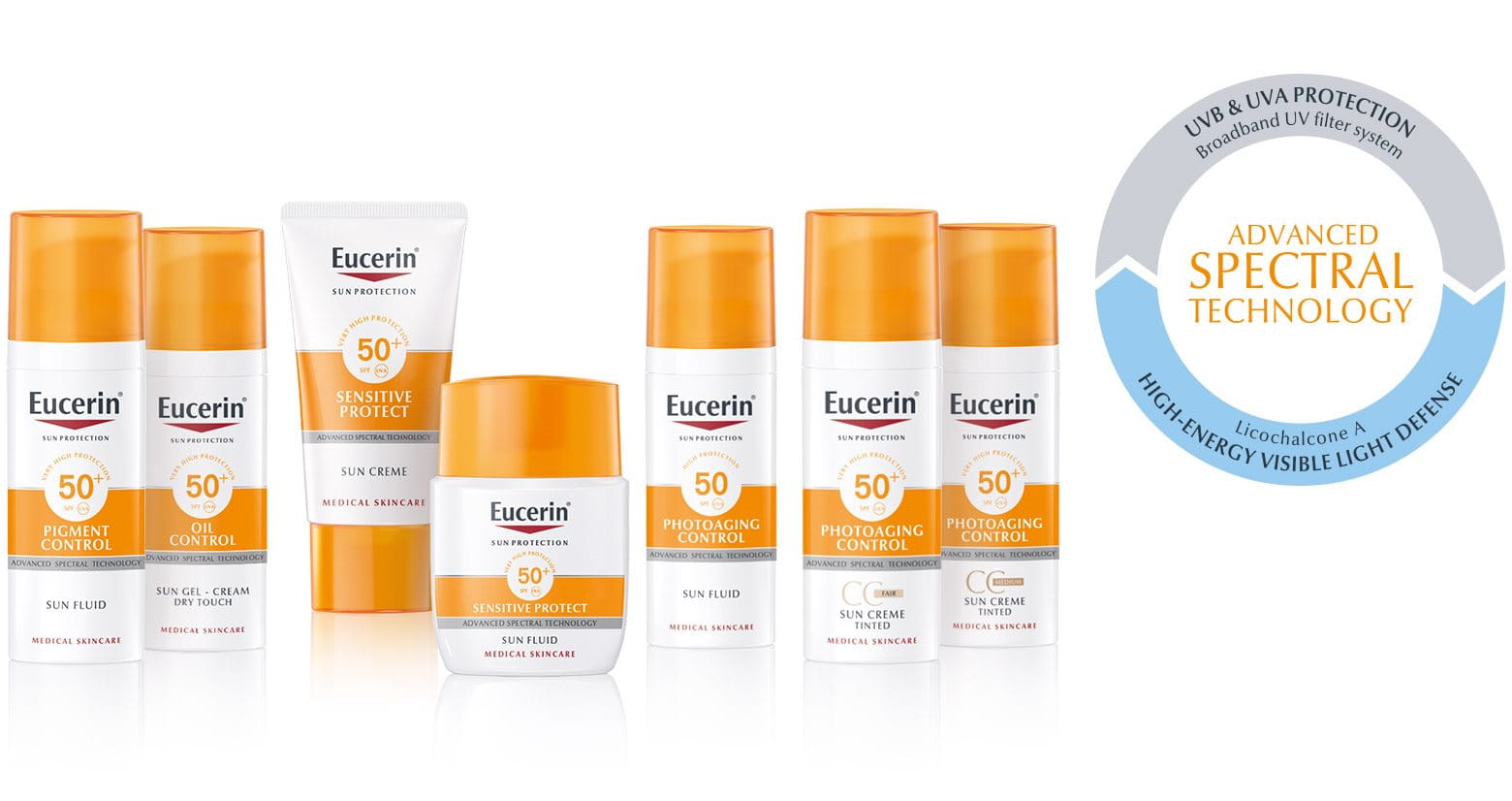
How should I apply sun protection to my face?
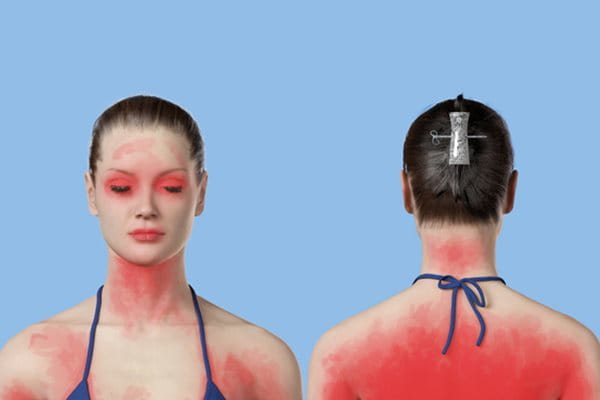
Apply sun protection in the morning afer, or instead of, your regular day care product. Be sure not to miss your ears, the back of your neck and, if you’re bald or have thinning hair, your scalp. Take care to avoid your eyes.
With Eucerin sun protection products your skin will be instantly protected so no waiting time is required and you can follow with make-up straight away if desired.
What is the right amount of product for my face?
As a general guide, a thick line of product that stretches from the tip of your middle finger to your wrist is normally enough to cover your face, neck and décolleté. If you are also using your facial product to protect the backs of your hands you may want to use a little bit more. And, of course, if you are spending time in the sun it’s important that you reapply your facial sun protection regularly and thoroughly, especially afer swimming and toweling.
You can find out how much product you need for the different parts of your body in How should I protect my body from the sun ?
Should I use the same product on my neck and décolleté?
We recommend you apply daily sun protection to your neck and décolleté (if it is going to be exposed). If the weather is sunny, and you are also using a body sun protection product, then you can apply that to your décolleté if you prefer.
Your hands are also exposed to sun on a daily basis. Rather than applying a body product, you may find it easier to massage your face protection product into the back of your hands as part of your morning routine.
Facial sun protection can help to protect against cellular DNA damage, photoaging (premature aging caused by the sun) and hyperpigmentation and facial sun protection should be considered as much a part of a daily skin care routine as cleansing, toning and moisturizing. A superior sun protection product, combined with a sensible approach to how long you spend in the sun, will help you to keep your skin healthy and looking young for longer.
Our brand values

We deliver a holistic dermo-cosmetic approach to protect your skin, keep it healthy and radiant.

We work together with leading dermatologist and pharmacist partners around the world to create innovative and effective skincare products they can trust and recommend.

For over 100 years, we have dedicated ourselves to researching and innovating in the field of skin science. We believe in creating active ingredients and soothing formulas with high tolerability that work to help you live your life better each day.


